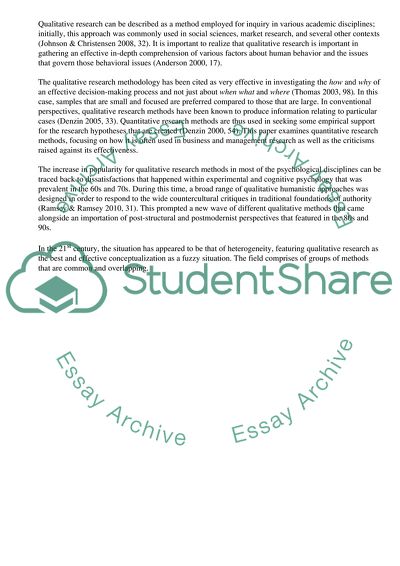Cite this document
(Qualitative researchers should not seek rigour and reliability. They Essay, n.d.)
Qualitative researchers should not seek rigour and reliability. They Essay. https://studentshare.org/management/1679617-qualitative-researchers-should-not-seek-rigour-and-reliability-they-should-not-set-out-to-measure-the-world-they-should-instead-seek-to-meet-the-world-and-must-therefore-conduct-in-depth-interviews-so-that-a-faithful-appreciation-of-the-complexities-of
Qualitative researchers should not seek rigour and reliability. They Essay. https://studentshare.org/management/1679617-qualitative-researchers-should-not-seek-rigour-and-reliability-they-should-not-set-out-to-measure-the-world-they-should-instead-seek-to-meet-the-world-and-must-therefore-conduct-in-depth-interviews-so-that-a-faithful-appreciation-of-the-complexities-of
(Qualitative Researchers Should Not Seek Rigour and Reliability. They Essay)
Qualitative Researchers Should Not Seek Rigour and Reliability. They Essay. https://studentshare.org/management/1679617-qualitative-researchers-should-not-seek-rigour-and-reliability-they-should-not-set-out-to-measure-the-world-they-should-instead-seek-to-meet-the-world-and-must-therefore-conduct-in-depth-interviews-so-that-a-faithful-appreciation-of-the-complexities-of.
Qualitative Researchers Should Not Seek Rigour and Reliability. They Essay. https://studentshare.org/management/1679617-qualitative-researchers-should-not-seek-rigour-and-reliability-they-should-not-set-out-to-measure-the-world-they-should-instead-seek-to-meet-the-world-and-must-therefore-conduct-in-depth-interviews-so-that-a-faithful-appreciation-of-the-complexities-of.
“Qualitative Researchers Should Not Seek Rigour and Reliability. They Essay”. https://studentshare.org/management/1679617-qualitative-researchers-should-not-seek-rigour-and-reliability-they-should-not-set-out-to-measure-the-world-they-should-instead-seek-to-meet-the-world-and-must-therefore-conduct-in-depth-interviews-so-that-a-faithful-appreciation-of-the-complexities-of.


